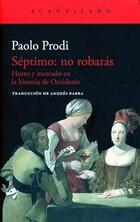This essay offers a reflection, as erudite as it is insightful, on the genesis of the market in the West, that space that, between the Middle Ages and the Modern Age, established itself in Europe as a subject, a collective identity, and an autonomous forum for judging the value of commodities. Paolo Prodi shows that the mercantile system, contrary to popular belief, historically represented a unitary whole that gave rise to the affirmation of the rule of law, democracy, and social and economic freedoms, to the point that democracy cannot survive without the market, nor the market without political democracy. However, in the era of globalization, when economic power demands a new "à la carte" law that reduces law to a contract, the market has entered into a profound metamorphosis whose contours we are barely catching a glimpse of. A lucid book that offers thoughtful clues for gazing at...read more
All book titles by this author
|
Title |
Price | ||
|---|---|---|---|
|
|
Séptimo: no robarás Author: Paolo Prodi Publisher: Acantilado Collection: Acantilado: El Acantilado |
$845.00
25%$633.75 |
Shopping cart
Loading cart
Important notices
|
|
Recordando a André Rouillé: Su legado en la fotografía André Rouillé 1948 - 2025 |
|
|
Libros de filosofía y co. Disponibles en Librería Herder |
|
|
Revista Filosofía & Co. nº 9 Nueva revista de filosofia divulgativa y actualidad |
|
|
"Espacios de la filosofía" - Mauricio Beuchot - Novedad Herder México |
|
|
Revista Filosofía & Co. nº 8 Nueva revista de filosofia divulgativa y actualidad |
Pay safely with:


In the webshop
New
|
|
La razón pendular de Emilio Uranga 69730 $450.00 -25.00% $337.50 |
|
|
Inteligencia del sueño 68204 $390.00 -0.00% $390.00 |
|
|
Botánica del sujeto 68208 $370.00 -0.00% $370.00 |
|
|
La mujer y el sacrificio 68207 $430.00 -0.00% $430.00 |
|
|
Elogio del riesgo 61955 $430.00 -0.00% $430.00 |
In the press
Promotions
|
|
Basiswörterbuch 28205 $390.00 -50.00% $195.00 |
|
|
Manual de la Biblia 20641 $2,410.00 -50.00% $1,205.00 |
|
|
Panorama B1.2 Curso 46507 $235.00 -35.00% $152.75 |
|
|
Panorama A1 Ejercicios. Ubungsbuch 39886 $395.00 -37.00% $248.85 |
|
|
Panorama B1 Ejercicios 47046 $475.00 -35.00% $308.75 |







